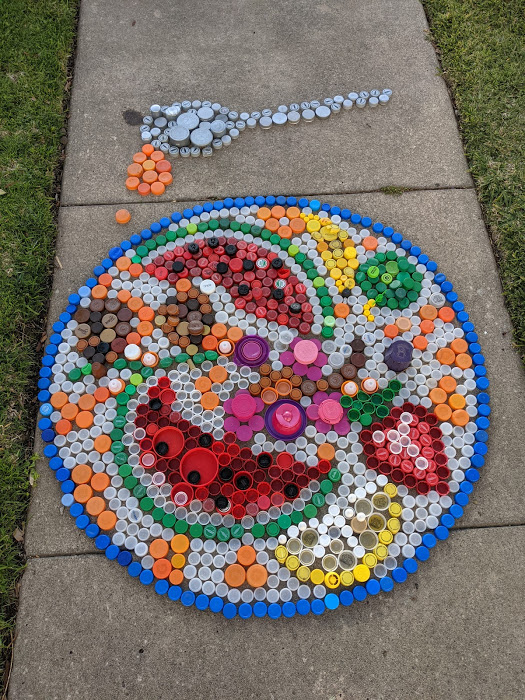Cap art a South Redondo sensation

Special-education P.E. teacher Carol Shreiner with the art she’s been making out of plastic bottle caps. Photo by Kevin Cody
by Rachel Reeves
When the coronavirus became a pandemic, two seemingly unrelated things happened for Redondo Beach resident Carol Shreiner. Her news feeds began to fill up with anxious, negative commentary, and her kitchen began to fill up with bags of donated bottle caps.
Her solution to the first problem came in a moment of inspiration. The plan was simple: she’d draw on the sidewalks and streets. Maybe chalk art would make someone smile.
“I just wanted to find a simple way to put some positivity out there without being preachy, you know?” said Shreiner, who teaches adapted physical education to disabled students in nine Torrance schools. She began drawing with chalk on the sidewalks and parking spaces in front of her house. She’d always been crafty, into scrapbooking and hand-making cards, but never had she considered herself an artist.
“It wasn’t until I was in the middle of doing some chalk art and a guy walked by and asked, are you the artist, that I was like yeah, I guess this is art. Yeah, I guess I am,” she said.
Her neighbors would walk by and thank her for brightening their day.
“They’d be like, thank you so much. When I started to get that feedback, I was like heck yeah, and that fueled me to keep going,” Shreiner said.
From the solution to the first problem came the solution to the second: the pounds and pounds of plastic bottle caps in her house. Trash bags full of them kept coming.
Together with former council member John Gran, Shreiner had founded the Redondo Beach Kiwanis Club’s Pay-It-Forward Buddy Bench program, which turns recycled plastic lids and caps into benches for schools. The benches are designed to help kids help each other.
“So if I’m sitting on the bench, you know I feel like I don’t have someone to play with or talk to so you can ask me if I want to play with you,” Shreiner explained. “It empowers kids to help each other rather than going to an adult.”
In 2019, Shreiner and Gran set a goal to build 500 benches in five years. A company in Indiana makes the benches out of used plastic caps and lids, and Shreiner and Gran find ways to either fundraise or engage volunteer drivers to transport the caps there and the benches back.
Before the COVID-19 pandemic, people would drop the caps and lids off at schools and students would clean, sort, and weigh the caps. When the schools closed, the caps began coming to Shreiner and Gran. They began sitting in the parking lot of Alta Vista one Saturday a month and inviting people, via social media and NextDoor, to drop off their bags of caps. Gran paid out-of-pocket for a storage unit to accommodate all the donations. He and Shreiner would clean and sort the caps, a job typically done by dozens of students working together. A trash bag takes about an hour to process, and some days they got 15 bags.
Each bench requires 200 pounds of recycled plastic. So far they’ve completed 21 benches, and are looking to place a new order for 30 benches — 5,000 pounds of caps — in June.
As the coronavirus pandemic wore on, Shreiner began thinking about the caps in her house, and whether she could use them to achieve the same effect she was having with her chalk art. She began making cap art, which quickly became a sensation in her neighborhood and on NextDoor.
“People tell me they structure their walks specifically to see this art,” Shreiner said. “I’ve had people come ask me what happened when I’ve skipped a weekend.”
The gardeners come on Fridays, so Shreiner takes her cap art creations down on Thursdays and makes new ones during the weekend. Shortly after she began the project last year, other residents in her building began pitching in to help.
The art has connected her to neighbors she’d never seen or talked to before.
“I’ve met so many people doing this,” Shreiner said. “People are enjoying the outdoors and consistently walking by and this is something to talk about, a reason to stop and chat. I’m so grateful that this community is amazing and has been so receptive to my playfulness.”
She also said the cap art has connected her to an artistic bent she didn’t know she possessed.
“I had this creativity in me that I didn’t even know was there,” she said. “I would’ve never known it was there if Covid hadn’t happened.” ER






